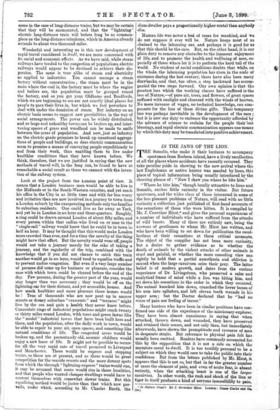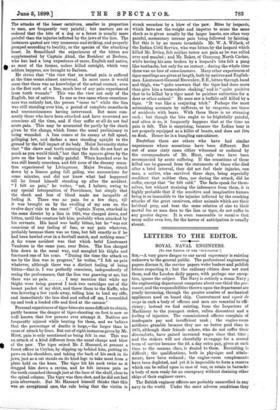IN THE JAWS OF THE LION. T HE Somalis, who make
it their business to accompany sportsmen from Berbera inland, have a lively recollection of all the places where accidents have recently occurred. They take peculiar pride in showing to the new arrival where the last Englishman or native hunter was mauled by lions, this piece of topical information being usually introduced by the cheering phrase of : "Now I show you where he bite him."
"Where he bite him," though locally attractive to lions and Somalis, excites little curiosity in the visitor. But future sportsmen, and the wider class of those interested in some of the less pleasant problems of Nature, will, read with no little curiosity a collection just published of first-hand accounts of the sensations of those who were bitten. It is compiled by Mr. J. Crowther Hirst,* and gives the personal experiences of a number of individuals who have suffered from the attacks of wild beasts. Many of these are entirely new, being the answers of gentlemen to whom Mr. Hirst has written, and who have been willing to set down for publication the recol- lections of their sensations at these critical moments. The object of the compiler has not been mere curiosity, but a desire to gather evidence as to whether the death of animals by the violent attacks of other animals is cruel and painful, or whether the more consoling view san rightly be held that a partial anaesthesia and oblivion is caused when the large carnivora seize their prey. The latter belief is of modem growth, and dates from the curious experience of Dr. Livingstone, who preserved a calm and analytical frame of mind while a lion was biting him, and set down his sensations in the order in which they occurred. The animal knocked him down, crunched the lower bones of his arm into splinters, and left eleven teeth wounds in his upper arm ; but the Doctor declared that he "had no sense of pain nor feeling of terror."
Many hunters who have been in similar positions have con- firmed one side of the experience of the missionary-explorer. They have been almost unanimous in saying that when attacked, thrown down, and wounded, they have preserved and retained their senses, and not only then, but immediately afterwards, have shown.the promptitude and resource of men in desperate straits. But reference to physical .pain felt has usually been omitted. Readers have commonly accounted for. this by the supposition that it is not a side on which the narrators cared to dwell. It is too terribly personal to be a subject on which they would_ care to take the public into their confidence. But from the letters published by Mr. Hirst, it appears that this is not so, but that in far the greater number of cases the element of pain, and even of acute fear, is absent entirely, when the attacking beast is one of the larger carnivora. In other words, the rush and shock of the lion or tiger in itself produces a kind of nervous insensibility to pain.
Is Nature Cruet? By J. Crowther RIM. London: James Clarke and 04
The attacks of the lesser carnivore. smaller in proportion to man, are frequently very painful ; but matters are so ordered that the bite of a dog or a ferret is usually more painful than the injuries inflicted by the jaws of the lion. The instances quoted are very numerous and striking, and properly grouped according to locality, or the species of the attacking beast. In Somaliland the experiences of the bitten are supplemented by Captain Abud, the Resident at Berbera, who has had a long experience of cases, English and native, . as most of the former, unless killed outright, which very seldom happens, are brought to Berbera.
He states. that, "the view that no _actual pain is suffered at the time seems almost universal. In most cases it would seem that there was no knowledge of the actual contact, even in the first rush of a lion, much less of any pain experienced from tooth wounds." This was the view not only of the English, but of natives. In one or two cases where conscious- ness was entirely lost, the person "came to" while the lion was still standing over him, a period of complete anaesthesia and unconsciousness having intervened. But more com- monly those who have been attacked and have recovered are conscious all the time, and if they suffer at all do not feel acute pain. This may be accounted for partly by the shock given by the charge, which forms the usual preliminary to being wounded. A lion comes at its enemy at full speed, galloping low, and dashes a man standing upright to the ground by the full impact of its body. Major Inverarity states that "the claws and teeth entering the flesh do not hurt as much as you would think," but that the squeeze given by the jaws on the bone is really painful. When knocked over he was still keenly conscious, and felt none of the dreamy sensa- tion experienced by Livingstone. Major Swaine, struck down by a lioness going full gallop, was unconscious for some minutes, and did not know what had happened till he found himself standing up after the accident. " I felt no pain," he writes, "not, I believe, owing to any special interposition of Providence, but simply that the shock and loss of blood made me incapable of feeling it. There was no pain for a few days, till it was brought on by the swelling of my arm on the twelve days' ride to the coast." Captain Noyes, attacked in the same district by a lion in 1895, was charged down, and bitten, until the creature left him, probably when attacked by his servants. His hand was badly bitten, but he "was not conscious of any feeling of fear, or any pain whatever, probably because there was no time, but felt exactly as if he had been bowled over in a football match, and nothing more." A far worse accident was that which befel Lieutenant Vandezee in the same year, near Beira. The lion charged him down in the usual way, and mangled his thighs and fractured one of his arms. " During the time the attack on me by the lion was in progress," he writes, "I felt no pain whatever, although there was a distinct feeling of being bitten—that is, I was perfectly conscious, independently of seeing the performance, that the lion was gnawing at me, but there was no pain I may mention that while my thighs were being gnawed I took two cartridges out of the breast pocket of my shirt, and threw them to the Kaffir, who was hovering a few yards away, telling him to load my rifle, and immediately the lion died and rolled off me, I scrambled up and took a loaded rifle and fired at the carcase."
Personal experiences of tiger-bites ere more difficult to obtain, partly because the danger of tiger-shooting on foot is now so well known that few persons ever attempt it. Natives are frequently injured while beating for them, and we believe that the percentage of deaths is large,—far larger than in cases of attack by lions. But out of eight instances given by Mr. Hirst, pain is only mentioned as being felt in one. This was an attack of a kind different from the usual charge and blow of the paw. The tiger seized Mr. J. Hansard, at present a forest officer in Ceylon, by slipping up behind him, putting its paws on his shoulders, and taking the back of his neck in its jaws; just as a cat stands on its hind-legs to take meat from a plate held on the knee. The tiger bit his neck twice as it dragged him down a ravine, and he felt intense pain as the teeth crunched through just at the base of the skull, close to the spinal column. The tiger was then shot, and he did not feel pain afterwards. But -Mr. Hansard himself thinks that this was an exceptional ease, the. rule being that the victim is- struck senseless by a blow of the paw. Bites by leopards, which have not the weight and impetus to cause the same shock as is given usually by the larger beasts, are often very painful, momentary intense pain being followed by fainting. But this is by no means invariable. Mr. W. A. Willock, of the Indian Civil Service, who was bitten by the leopard which killed Mr. Irvine, felt neither terror nor pain as he was rolled over and mauled ; and Mr. Baker, of Gunyong, North Culler, while having his arm broken by a leopard's bite felt a pang like toothache, but only for an instant ; during the whole time there was no loss of consciousness. Many other experiences of tiger-maul ings are given at length, both by natives and English- men. Lieutenant-General Brownlow, R.E., bitten through hand and thigh, was " quite unaware that the tiger had done more than give him a tremendous shaking," and is " quite positive that to be killed by a tiger must be painless extinction for a deer or other animal." He once saw a buffalo calf killed by a tiger. " It was like a conjuring trick." Perhaps the most astonishing accounts by sufferers, or by surgeons, are those of accidents with bears. With these there is no stunning rush ; but though the bite ought to be frightfully painful, and often is so, it frequently happens that at the time no pain is felt. This is surprising, because the Indian bear is not properly equipped as a killer of beasts, and does not live on flesh. Hence he is a bungling executioner.
Doubtless there are others who have had similar experiences whose sensations have been different. But out of some sixty cases either witnessed or endured by the correspondents of Mr. Hirst, only two have been accompanied by acute suffering. If the sensations of those killed can be guessed from the statements of those who died after a brief interval, they did not feel their injuries, one man, a native, who survived three days, being especially confident that neither then, nor during the attack, did he suffer, except that "he felt cold." The facts speak for them- selves, but without straining the inferences from them, it is highly probable that if the sensitive and imaginative human being is so insensible to the injuries inflicted by the crushing attacks of the great carnivore, other animals which are their habitual prey, and bear the same relation of size to their mortal foe as man does to the lion or tiger, do not suffer in any greater degree. It is even reasonable to surmise that many suffer even less, for the horror of anticipation is usually absent.







































 Previous page
Previous page